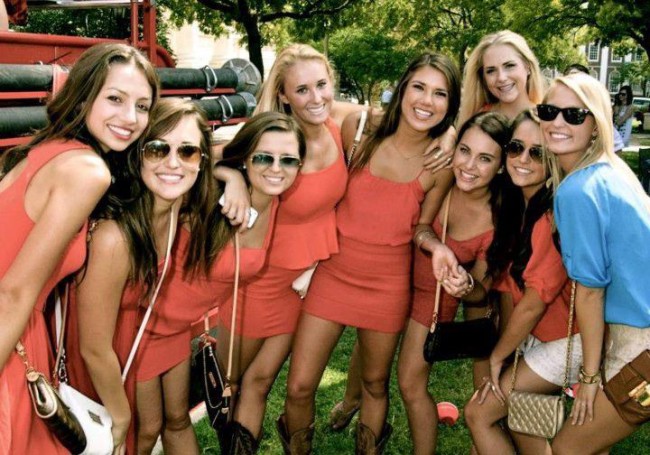From the perspective of an incoming freshman, the public personae of SMU can be extremely intimidating. When deciding on a university that will take up the next four years of one’s life, the stereotype is all one has to go on. The majority of the time, the assumed culture is very inaccurate, especially at Southern Methodist University, unofficially known as Southern Millionaire’s University.
Southern Methodist University lives up to every expectation of a college campus. From the manicured landscape to the picturesque sorority and fraternity rows, this university has created a perfect campus for the anxious high school senior.
“SMU looks like what people imagine a college is to look like,” Dr. Lori White, Vice President of Student Affairs, said. “I think it’s inviting to students. Anyone who visits our campus has to get excited about the possibilities of being able to study at such a beautiful school.”
However, this flawless backdrop may also create room for stereotype development. With no personal experience to draw from, it’s possible for students to translate the impeccable matching Georgian architecture and the highest tuition in Texas into nervousness about being able to keep up socially. Who has money? Who doesn’t? Do students turn away due to fears of keeping up?
“I think the stereotype is definitely changing,” White said. “When people learn that information of the stereotype, they have to know SMU students are really smart even though they are socially focused as well.”
There is a false perception that SMU students are snobby, wealthy and privileged. However, statistics show almost 77 percent of students are on financial aid.
“People more often than not discuss the negative stereotypes rather than the positive facts,” Beau Barnes, senior football player, said.
With SMU consistently rising in the rankings and increasing its admission standards, one would believe these stereotypes at SMU would continue changing.
“I believed SMU was a prestigious school that had many motivated students and faculty from whom I would benefit from being around,” Kylie Callier, junior cheerleader and sorority member, said. “But I did hear the students were really snobby.”
One of the most persistent complaints from students and their parents are the issues involving the Greek life on campus. They see, or fear, that the organizations are an excuse for exclusion rather than an opportunity for involvement and an outlet for meeting new people and making new friends.
“The stereotypes make us who we are: a competitive private school that is not an Ivy, in a great city with beautiful grounds, that has great traditions and an amazing Greek community,” Panhellenic President Lauren Fann said. “The purpose behind these organizations is to teach women and men to be morally sound, tradition followers, scholars, and presentable people in society.”
Affiliating with the Greek system is often criticized as buying into the cliquey atmosphere. The idea that if you’re not in, you’re out is prevalent on campus.
Greek life makes up 40% of the student body. The organizations or activities on campus one chooses to be a part of determines the kind of college experience one will have. Fortunately at this campus, there is a multitude of groups or clubs to join based on your personality and interests. Because most of students are so involved in a vast variety of activities, it makes for a very well-rounded student body, according to Fann.
“I was apprehensive about being involved in both cheer and Greek life, but I wouldn’t trade the relationships and lessons I have gained from either of them for anything,” Callier said. “They have been huge factors in my success as a college student.”
SMU sororities and fraternities participate in philanthropies as well as community service. Uniquely, greek organizations have many associated events and open door policies. At some campuses, there are actually bouncers outside of fraternity parties.
“I’m glad we have a very social campus because we want students to come here and enjoy their experience at SMU, to get involved in various leadership positions, and get connected socially on campus,” White said.
Greek life isn’t the only way to get involved on campus. Fortunately, SMU consistently offers opportunities for students in over 200 organizations for a variety of interests. At SMU, you can even create your own club and register it with Student Affairs.
“I feel that most students are given opportunities to experience everything that the social groups at SMU have to offer,” Barnes said.
Another criticism of SMU, even before the addition of the Bush Library, is that it is so Republican. Last week College Prowler ranked SMU as 1400 out of 1401 for being the “most close-minded” universities. This is probably because SMU does not have a lot of diversity on campus according to Barnes, and it is an issue the university can’t afford to ignore.
SMU is not alone in striving to break the status quo attached their university. In an academically competitive atmosphere, stereotypes are to be expected, and whether one chooses to believe them is one’s own conscious decision.
“I think what also feeds this stereotype is we don’t care,” Callier said, “Through my years here, I’ve noticed that we exude confidence, which is often misinterpreted. There are always going to be people who confirm the stereotype, but wealth is not synonymous with being snobby.”
SMU is ranked No. 17 in “Happiest Students” according to Princeton Review. The kind relations the students have with one another is apparent when visiting the campus, according to White. SMU has created a welcoming environment for a large spectrum of people. There is a place for every student here if one takes the time to look for it.
“We as a community are a force to be reckoned with,” Fann said. “Personally the stereotypes don’t bother me; they make me want to work harder to live up to the hype that has been placed on our school.”









